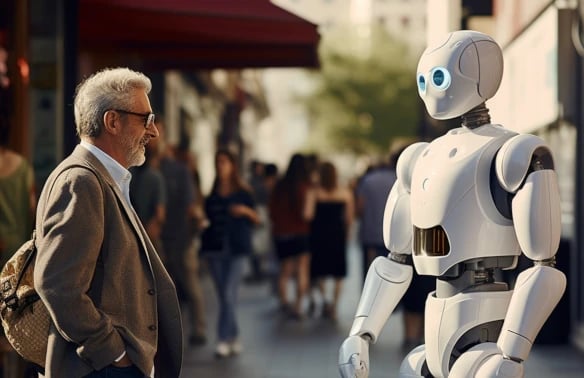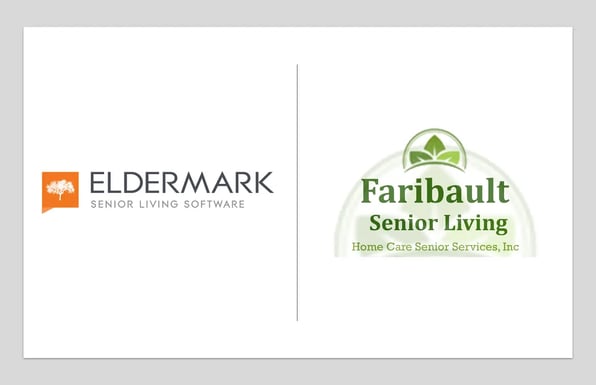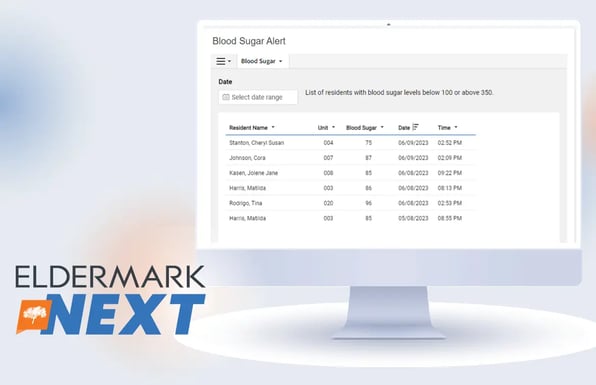The Future is Here: How AI is Transforming Assisted Living Centers

Americans were introduced to the power of artificial intelligence (AI) in 2011 when IBM’s Watson debuted on Jeopardy! in a matchup with two of the show’s top contestants, Ken Jennings and Brad Rutter. The supercomputer handily beat the two by interpreting the questions, sorting through and analyzing terabytes of data, and ringing in the correct answers in a fraction of a second.
Watson introduced AI to the healthcare industry when its ability to quickly find value in the volumes of complex health data became a transformational diagnostic aid for doctors. A decade later, ChatGPT built on Watson’s groundbreaking technology, bringing generative AI to the world. The super-smart virtual assistant comprehends questions on virtually any topic and analyzes its vast database to compile a complete, cohesive response in a conversational tone.
Now, a flood of new AI products are revolutionizing the healthcare industry. The technology offers innovative solutions to improve care and support for patients and elderly individuals in senior care settings.
Assisted living providers are learning how artificial intelligence and augmented intelligence — systems that work with humans to enhance their decision-making abilities — can improve operations in a senior community.
What Can Be Improved With the Use of AI?
A comprehensive software built for senior living communities integrated with AI-powered tools can increase operational efficiencies and improve resident care and quality of life.
Below, we dive into some specific ways AI technology can benefit senior living and assisted living centers.
Resident Care and Support
Smart home products like Amazon’s Alexa are commonplace in homes, and now, these AI virtual assistants are making life easier for America’s aging population and their caregivers. Watches and other wearable devices that monitor heart rate and other vital signs can be lifesavers in an elder care environment. Even robots, such as Pepper from RobotLab, are being introduced to assisted living centers to engage seniors.
AI-powered virtual assistants, monitoring devices, and products designed specifically for senior living communities can improve resident care and free up staff. The technology enables residents to maintain a sense of independence in managing their routines and daily living activities. For example:
- Wearables and products provide real-time vitals tracking and predictive analytics to identify potential health risks. Staff no longer have to visit each resident to take vital signs.
- Virtual assistants can give residents medication reminders, meal-time alerts, and answer queries, giving seniors an increased sense of control and limiting their stress by not requiring as much staff assistance.
- Facial recognition products can alert staff when residents wander from their rooms.
Safety and Security
Whether via wearable devices, sensors, or video monitoring, the future of elder care will detect and alert staff of falls, wandering, or inactivity for improved response time to potential medical emergencies.
Through AI learning, some products can adjust to behaviors as appropriate. In addition, staff can review the data to correct issues that may have contributed to the incident and learn each resident’s daily activity patterns.
Here are some examples of how AI can help you prioritize security to keep your older adults safe:
- Sensors can detect an unusual number of bathroom trips, for example, alerting staff to a potential sickness.
- Smart surveillance cameras with facial recognition can monitor and restrict unauthorized access to the premises and resident rooms.
- GPS devices, using AI algorithms to track residents' movements, provide real-time location tracking for residents.
- Motion sensors connected to virtual assistants can alert staff to unusual behaviors or movements around a resident’s room or the building.
- Voice-activated or keypad access AI systems can provide secure access to staff-only areas, ensuring only authorized personnel can access designated spaces.
Daily Operations and Facility Management
Machine learning, a type of AI where computers learn and improve from experience and input, is becoming standard in mobile apps and business operations software. Many programs and apps incorporate machine learning algorithms to enhance functionality and make predictions or decisions based on data patterns.
Machine learning models can help the maintenance department of senior housing sites proactively address maintenance requirements and minimize disruptions by predicting equipment maintenance needs and facility issues. AI can even streamline administrative tasks, such as billing and appointment scheduling, and help your in-house HR team optimize resources by enabling more efficient staff allocation.
Plus, AI smart home products with environmental controls to adjust lighting and temperature according to resident preferences and daily routines can eliminate waste and help save money on utilities.
Clinical Decisions
AI’s ability to access and interpret vast amounts of data means doctors and clinicians are able to turn to AI for assistance with diagnoses and treatments. Now, AI can do the same for the clinical decisions being made by the nursing staff in your senior living community. AI can provide real-time data analysis of patient records, support with diagnosis and treatment, medication management, and insight into which treatment protocols are most effective in improving care plans.
Additionally, AI can support the healthcare team by providing insights into resident activities, emotions, and vital signs, ensuring timely responses to potentially dangerous health conditions.
Marketing and Communication
Daily, weekly, and monthly emails and newsletters are critical for communicating key information to residents, staff, and families, but they can be time-consuming to create. AI-supported tools can write the emails for you, or analyze and improve the grammatical accuracy and spelling of documents you write yourself.
Create marketing material, menus, factoid sheets, and other reading material for your residents. Using AI to keep your senior living community up-to-date with the latest news and information will free up countless times for interacting with your residents and their families.
Data-Driven Insights and Decision Making
AI’s strength lies in its ability to analyze and extract valuable insights from unstructured medical data, such as electronic health records (EHRs), product and device data, financial data, and clinical notes. AI’s natural language processing (NLP) capabilities generate results in a way that is both meaningful and relevant to the user. AI solutions can learn and synthesize human language, images, video, and software code.
Directors can use AI programs to uncover operational inefficiencies and hidden costs, enabling them to initiate cost-saving measures or adjust resources as appropriate. Insight into financial trends, staff utilization, and insurance claim issues allows teams to pivot care and resources based on real-time data.
Ethical Considerations and Privacy Concerns of Using AI
While the benefits of using AI-powered products and software in assisted living communities are clear, the debate over residents’ invasion of privacy and loss of autonomy blurs the line between using technological advancements and the ethical considerations of the technology. How can residents maintain their dignity and independence when AI systems monitor their every move?
Senior centers using AI-driven care and treatment risk excluding the seniors and their family members from decisions about the residents’ well-being. Assisted living centers must adopt a company culture whereby staff use AI tools to complement their decision-making, rather than letting AI drive the care.
Residents, their families, and staff must understand how AI technologies integrate into daily life at the center and how the data is protected and used to mitigate privacy concerns. Finding a way to strike the right balance between leveraging AI and ensuring residents' privacy and autonomy is critical to building trust and offering the best care.
Challenges of Adopting AI
Integrating AI into senior living environments can be difficult and costly. Family members who have previously dealt with the challenges of keeping their loved ones safe and secure know some of the AI tools on the market and may assume assisted living centers already use them. However, understanding the full data usage and protection implications is imperative for compliance and trust.
Senior communities need to prioritize full transparency regarding these technologies. The Brookings Institution reports it is “imperative to educate patients on the utilization of their data, the privacy safeguards in place, and the nuanced benefits and risks associated with AI” to optimize the deployment and adoption of AI.
Transparency measures also include being open about the cost. The installation and maintenance of AI devices require a reliable IT infrastructure to manage and protect the data and the cloud computing requirements. Finding the budget for the products and added specialists may require a multi-phased approach. Keeping the residents, their families, and staff informed of the expenses and implementation complexities is critical.
Finally, even if you can secure the budget, your employees will likely resist the implementation at first. Change is tough, and finding the time to learn new technologies can be hard.
Keep an open mind and an open door to let residents and staff know you are available to listen to them and address their concerns at any time.
How Eldermark and AI Can Transform Your Senior Living Center
Advancements in technology can help transform your senior living or assisted living center. Our end-to-end Eldermark NEXT platform offers a comprehensive software solution to keep your operations streamlined and efficient. Combining it with AI-powered solutions ensures your residents receive the personalized care and attention they deserve, and your staff can efficiently manage their time and tasks.
Contact us today to learn about how Eldermark NEXT can help your senior living team.




